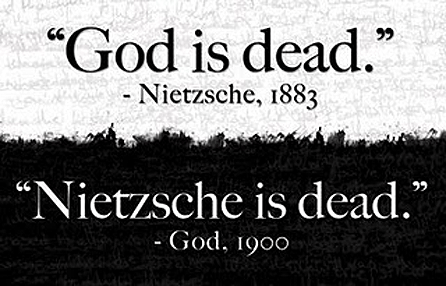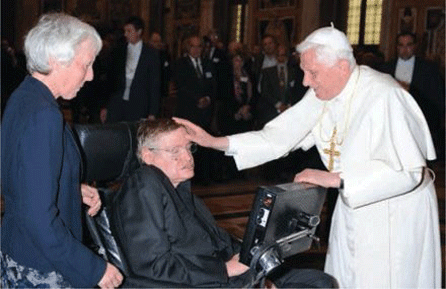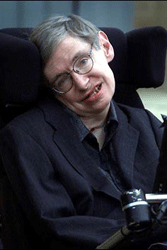Does Stephen Hawking Sacrifice God on the Altar of Science?
 The Grand Design, a new book by Stephen Hawking, has widened the chasm between science and faith. How does a person of both faith and reason bridge the abyss?A few weeks ago, Pope Benedict XVI beatified John Henry Cardinal Newman in Birmingham, England. The Holy Father emphasized Cardinal Newman's "insights into the relationship between faith and reason," and commended him for applying "his pen to many of the most pressing subjects of the day." Without doubt, Cardinal Newman would have a pointed response to the media tremors of the last two months after physicist and author, Stephen Hawking declared that science explains the creation of the Universe without God.I mentioned Stephen Hawking in a recent post, "A Day Without Yesterday: Georges Lemaitre, Albert Einstein, and The Big Bang." His declaration about creation came in The Grand Design. Many in the media called it a definitive statement about the existence of God. It was no such thing.I can't claim to have even a fraction of the gifts of faith and reason that Blessed John Henry Newman would call upon to respond, but as a priest who respects science, I feel driven to weigh in. First, I have to confess that I haven't yet read The Grand Design, but I will. However, in a full page article in The Wall Street Journal last month, Stephen Hawking and Leonard Mlodinow laid out the cosmology behind the book and their conclusions ("Why God Did Not Create the Universe," September 4-5, 2010).It is to that article that I here respond. If you have a concern for the implications of Professor Hawking's pronouncement that God had nothing to do with bringing you and your world into being, read on. There’s a lot at stake. I'll address this from two points of view.MY RESPONSE AS A PRIESTLike Father Georges Lemaitre and Blessed John Henry Newman, my response is first and foremost that of a Catholic priest. I have known many priests who have struggled with faith and some who have lost their faith. I correspond regularly with a priest who lost his faith years ago. Now this declaration by Stephen Hawking feels like a nail in faith's coffin for him.I have lived 57 years of struggle over the question of God. I have arrived - in spite of toil, trial and tribulation, and more than my share of each - at what I think is a more than tepid faith in God's existence. I believe in His creation of our existence. I believe in His enduring and caring Presence in this life and in all our lives. I believe that our relationship with Him survives this life. I have read nothing in any of Stephen Hawking's writings that causes me to wonder whether my faith conclusions are valid. I write as a priest and believer.Remember "The Day the Earth Stood Still"? I don't mean the great Cold War era film with Gort the Robot. I mean my post about the not-so-great "enlightenment" of the 1960s and 1970s. My faith and my priesthood both came into being in a time of great social upheaval.
The Grand Design, a new book by Stephen Hawking, has widened the chasm between science and faith. How does a person of both faith and reason bridge the abyss?A few weeks ago, Pope Benedict XVI beatified John Henry Cardinal Newman in Birmingham, England. The Holy Father emphasized Cardinal Newman's "insights into the relationship between faith and reason," and commended him for applying "his pen to many of the most pressing subjects of the day." Without doubt, Cardinal Newman would have a pointed response to the media tremors of the last two months after physicist and author, Stephen Hawking declared that science explains the creation of the Universe without God.I mentioned Stephen Hawking in a recent post, "A Day Without Yesterday: Georges Lemaitre, Albert Einstein, and The Big Bang." His declaration about creation came in The Grand Design. Many in the media called it a definitive statement about the existence of God. It was no such thing.I can't claim to have even a fraction of the gifts of faith and reason that Blessed John Henry Newman would call upon to respond, but as a priest who respects science, I feel driven to weigh in. First, I have to confess that I haven't yet read The Grand Design, but I will. However, in a full page article in The Wall Street Journal last month, Stephen Hawking and Leonard Mlodinow laid out the cosmology behind the book and their conclusions ("Why God Did Not Create the Universe," September 4-5, 2010).It is to that article that I here respond. If you have a concern for the implications of Professor Hawking's pronouncement that God had nothing to do with bringing you and your world into being, read on. There’s a lot at stake. I'll address this from two points of view.MY RESPONSE AS A PRIESTLike Father Georges Lemaitre and Blessed John Henry Newman, my response is first and foremost that of a Catholic priest. I have known many priests who have struggled with faith and some who have lost their faith. I correspond regularly with a priest who lost his faith years ago. Now this declaration by Stephen Hawking feels like a nail in faith's coffin for him.I have lived 57 years of struggle over the question of God. I have arrived - in spite of toil, trial and tribulation, and more than my share of each - at what I think is a more than tepid faith in God's existence. I believe in His creation of our existence. I believe in His enduring and caring Presence in this life and in all our lives. I believe that our relationship with Him survives this life. I have read nothing in any of Stephen Hawking's writings that causes me to wonder whether my faith conclusions are valid. I write as a priest and believer.Remember "The Day the Earth Stood Still"? I don't mean the great Cold War era film with Gort the Robot. I mean my post about the not-so-great "enlightenment" of the 1960s and 1970s. My faith and my priesthood both came into being in a time of great social upheaval.

The existentialist, Frederick Nietzsche (1844-1900) seemed to rule the reasoning - or lack thereof - of the sixties. His contempt for Judaism and Christianity, and his cynical view that mankind is but a herd at the mercy of the ruling and gifted intellectual elite, marked the dawn of the "God is Dead" movement. The bumper stickers were everywhere:
"GOD IS DEAD!" Nietzsche
In the seventies, the wave began to dissipate, but not before destroying the faith of many who bought into it. I remember buying a bumper sticker for my seminary room door in 1978:
"NIETZSCHE IS DEAD!" God
The three masters of deceit - Freud, Marx, and Nietzsche are all dead - not only their persons but their ideologies as well. Each reduced man to his basest, soul-less drives, and each in his own way was an enemy of faith.

I do not count Stephen Hawking among them. Contrary to what the news media is lifting out of his latest book - and out of context - Stephen Hawking does not denounce God, nor does he claim to have proven that God does not exist. The exact quote that so many in the media now read into from his WSJ article cited above, and from his book is this:
"The discovery recently of extreme fine tuning of so many laws of nature could lead some back to the idea that the grand design is the work of some grand Designer. Yet the latest advances in cosmology explain why the laws of the universe seem tailor-made for humans, without the need for a benevolent creator."
This comes as no great revelation. One might expect that I, as a priest, would proclaim that the Universe was brought into being and maintained, at least in part for our benefit, by a Divine Creator whose title is also His name: God. But does anyone really expect Stephen Hawking, or any cosmologist to make the same declaration? What Professor Hawking has written is neither new nor surprising in cosmology.I do not, and will never have a faith that depends on science to finally and definitively weigh in on God's creation of the Universe. Science should never be able to do this to the satisfaction of any person of faith. To say that science can explain creation without God is not to say that God didn't create everything - including the science and scientists trying to nudge Him from center stage.Faith is far more than the dictates of reason and the pronouncements of science. Our tradition of faith does not reduce God to His quantum mechanics, and does not promise to teach all there is to know about the created Universe or the laws of physics.Our faith promises that we can know God through Christ in a personal relationship without fully explaining God. Faith is not an event, and science doesn't make or break it. Faith is a pilgrimage, and like any pilgrimage, most of us will have times of wandering, and wondering whether we will ever arrive, whether we will ever get to the point at which there are no doubts. That's the point of faith. It is its own evidence.
"Faith is the assurance of things hoped for; the conviction of things unseen" (Hebrews 11:1).
Faith at some point involves an assent of the intellect (Catechism of the Catholic Church, 15) to the revealed truth about God Himself. Central to that truth is the redemption offered to us through Christ who not only reveals God to man, but "fully reveals man to himself" (Gaudium et Spes, 22). None of us looks to Stephen Hawking, or to science, to reveal the truth about God. Faith in God and His creation can no more be subjected to the scientific method than science can legitimately be subjected and defined in the light of faith.MY RESPONSE AS A STUDENT OF SCIENCEI write secondly with a lifelong respect for science as a tool, not for understanding God, but for understanding the mechanics of the Universe in which we exist. I recently wrote of one of my heroes on the parallel journeys of both faith and science in "A Day Without Yesterday." It's the story of priest and physicist, Father Georges Lemaitre, the originator of the Big Bang explanation of cosmology, and the man who changed the mind of Einstein on the origin of the created Universe.A French publication, Les Dossiers De La Recherche (No. 35, May 2009) contains an interesting article entitled "Le Big Bang Histoire: De La Science A La Religion" ("The History of the Big Bang: From Science to Religion"). I'm grateful to my Belgian friend, Pierre Matthews, who knew Father Georges Lemaitre personally, for his kind translation into English:
"Pope Pius XII, an enthusiastic amateur astronomer, addressed the Pontifical Academy of Sciences in 1951. His talk dealt with recent findings in cosmology, stating: 'It appears truly that today's science going back millions of centuries has succeeded to witness the initial "fiat lux" [Let there be light], coming out of nothing, that very moment of matter and ocean of light and rays, while the chemical components of particles split and assembled into millions of galaxies.'Pope Pius XII refers openly to Fr. Lemaitre's scenario. But this 'concordism' assumed to exist between revealed truth and science is counter-publicity for those, among them Fr. Georges Lemaitre, wanting a total and independent separation of the history of the Universe, evolution, and religious truth.Following a meeting with Fr. Lemaitre, Pope Pius XII a year later rejected, before the General Council of the International Astronomical Federation, any concordance between the two fields: science and faith. For Father Lemaitre, it was a double victory: cosmology can develop in total freedom and religion should no longer fear contrary positions based on new scientific discoveries."
Why was Father Georges Lemaitre so insistent that the Pope should declare no concordance between faith and science? The obvious reason is that, for Father Lemaitre - a man of deep faith and a brilliant physicist and cosmologist - faith and science are parallel fields and should never limit each other. The Church suffered a black eye for its condemnation of Galileo's views about science 350 years ago, but science has often seemed utterly ridiculous for holding the Church in contempt for not responding to science in 1660 as it would in 2010.

Five years ago, noted science writer, Chet Raymo wrote a blog post entitled "The Future of Catholicism" on his Science Musings blog (April 10, 2005). Raymo wrote:
"In spite of the pope's outreach to the scientific community, the Church has been slow to understand the theological implications of the scientific world view. The Church's truce with modern cosmology and biology is uneasy at best, although certainly more enlightened than the outright rejection by fundamentalist faiths."
Chet Raymo was right, but he very much understated the appreciation for scientific achievement demonstrated by the Church in the last century. I had a brief discussion about this a few days ago with a fundamentalist Protestant minister I know. He's an educated man, a university graduate, and well read but only very narrowly so. I asked him what he thought of the latest controversy surrounding Stephen Hawking's views.His response came as no surprise, and it was little different from what we might have heard from one of the Calvinist Puritan founders of New England in 1620. His view was an utter rejection of science. "The Universe was created by God in six days about 6,000 years ago. There is no such thing as poetic and metaphorical language in Scripture.” I asked him how he would explain the discoveries of bones that are many tens of millions of years old, or the fact that we can see galaxies that are millions of light years away. His answer was to simply ignore the questions.Of course, this man also believes that the Catholic Church is the anti-Christ and the "Whore of Babylon." He believes it is not only science that should be condemned, but the Catholic Church as well, and he would cite the Church's nod to science as evidence for that view.Science is the empirical examination of the physical Universe. Gone are the dark days in which science and religious dogma demanded conformity one with each other. There are legitimate forums for dialogue, however. It's more than ironic that Stephen Hawking is a lifetime member of the Pontifical Academy of Science. There are now calls for him to resign, but I believe he should retain that position. Dialog should not require conformity, and the Church should not be daunted by diverse scientific views.Later this month, a symposium called "The Vibrant Dance of Faith and Science" (www.vibrantdance.org) will take place in Austin, Texas featuring religious and scientific scholars from many fields, and sponsored by the Hill Country Institute for Contemporary Christianity. Additionally, The Catholic Laboratory (www.catholiclab.net) is an excellent resource for a Catholic-science dialogue, as is the Catholic Education Resource Center.Using Father Georges Lemaitre's model, Stephen Hawking should no more publicly weigh the legitimacy of Judeo-Christian belief in Creation as a design plan of God than the Pope should affirm or deny black holes. My concern for the current controversy surrounding Stephen Hawking's present endeavor is not that it encourages masses of believers to set aside their Catholic faith, as Chet Raymo declared to have done in his 2005 post, but that it may have the effect of encouraging some to set aside science.Professor Hawking's foray into the realm of faith does not change the way I perceive God. What it does change is my respect for the strides taken by science to speak also to the masses of people who are not scientists, but are people of faith. There is a danger that science is gradually placing itself outside the experience of the great majority of people while claiming to enlighten its own elite. In this, there is a growing rift between science and the reality experienced by billions of people of faith.Stephen Hawking's view is in danger of sparking a return to the bad old days of Nietzsche, this time by the establishment of the uber-scientist for whom masses of faithful believers are but an ignorant herd. It is science, and not faith, that faces the greatest harm.Stephen Hawking presents that the laws of gravity, and not God, created the Universe we live in. I'm not prepared to rewrite Scripture. It is not the experience of thousands of years of belief that "In the beginning, Gravity created the heavens and the earth."I have a response as a prisoner, too. I certainly believe in gravity, but there's precious little solace in it, and it speaks nothing to the reality of my soul. Sorry, Professor. I respect your cosmology, but I think you've thrown in with the wrong "G!"I still like you, though, and I believe God does, too.

